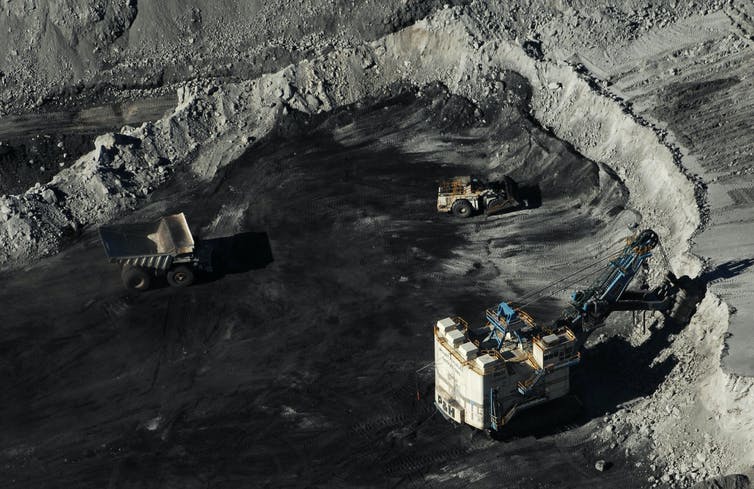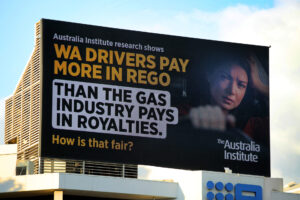Getting coal for Christmas is supposed to be a bad thing. But for Australia’s coal mines, all their Christmases seem to have come at once!
This week, Environment Minister Tanya Plibersek decided not to reconsider the environmental impacts of three coal mines, mines that are almost big enough to swallow Sydney whole.
Owned by BHP, Mitsubishi and other multinational corporations, these mines will impact koalas, gliders and many other threatened species.
Minister Plibersek’s decision was not surprising.
The Environment Council of Central Queensland had previously asked her to reconsider other coal mines. She reconsidered … and then approved the mines anyway.
That decision set up the embarrassing situation of Australia’s Environment Minister fighting in court to approve coal mines, alongside mining companies against environment groups.
To be clear, when the Environment Minister had to choose a side – coal companies or the environment – she chose coal companies.
And there’s plenty more in the coal companies’ stockings.
Research out this week from The Australia Institute shows that the NSW government spends five times more money promoting coal than it has budgeted for helping mining communities’ transition away from coal.
The state’s four regional “Future Jobs and Investment Authorities” are supposed to “support communities reliant on the coal industry to secure their long-term economic future as the global demand for coal declines over time”.
These authorities have a combined initial budget of just $5.2 million and a promise of more money in 2028.
By contrast, Coal Innovation NSW spent $27 million on programs that promote the coal industry in 2022-23 (latest available), including into that perennial “clean coal” boondoggle, carbon capture and storage.
Despite decades of talk and subsidies, NSW has precisely zero functioning carbon capture and storage projects.
Another funder of all “clean coal” ideas is the $700 million fund, Low Emissions Technology Australia (LETA), previously known as Coal21.
LETA is funded by coal companies, which can partially deduct payments to LETA from their royalty obligations, providing a handy public subsidy.
LETA has so much money that it recently told coal companies to stop paying it. I swear I’m not making this up.
“Given the current high levels of cash against lower project cash commitments,” LETA said, “the raising of future payment notice invoices is to be suspended.”
In other words, as the world heads into a climate crisis, there is a low-emissions technology group begging for less funding. They just can’t use all the money.
Can you imagine any other climate research group asking for less money? That they had no ideas to explore? Nothing urgent to do?
No discussion of largesse to the coal industry would be complete without mentioning the Fuel Tax Credit Scheme, which refunds fuel tax to major diesel users, particularly the mining industry.
The scheme costs the Australian government $10 billion per year, more than is spent on the army ($9 billion), and almost as much as government school funding ($11 billion).
A lot of ink gets spilled arguing over whether this scheme is a fossil fuel subsidy.
The OECD and the International Energy Agency say it is, while the Minerals Council and the Productivity Commission say it’s not.
What is not debated is the cost, or the benefit it provides to the coal industry.
The Fuel Tax Credit Scheme provides more than $1 billion to the coal industry each year, money that could otherwise have been spent on schools, hospitals or aged care.
Look over there! What’s that?! Is it the Grinch coming to steal the coal industry’s biggest Christmas present?
Maybe not actual Grinches, but the Greens and crossbenchers like Kate Chaney, David Pocock and Allegra Spender have said that they want to reform the Fuel Tax Credit Scheme.
One option for reform would be to place a cap on use of the scheme, meaning it would still benefit farmers but the handout to mining companies would end.
Just like a child threatened with coal for Christmas, the Minerals Council of Australia responded to the crossbenchers with a tantrum, somehow claiming that making their members pay fuel tax will push up prices for everyone else.
This is nonsense, unless you are one of the few people who go to the supermarket and buy coal by the cargo ship load.
That didn’t stop Mining Minister Madeline King from backing the Minerals Council, declaring that the subsidy would not change and that even discussing it was “misinformation”.
So while Christmas 2024 is looking good for the coal industry, the next parliament might keep a much closer eye on whether the miners have been naughty or nice.
It is worth spelling out the implications of this.
Community independent politicians are pushing for a reform that would take billions of dollars from the likes of BHP and Glencore and spend it on social services.
If the next parliament can wind back Australia’s biggest fossil fuel subsidy, a policy that has both major parties’ support, what else might it be able to do? Housing? AUKUS? Jobseeker?
We’ll find out if we’re all good in 2025.
Between the Lines Newsletter
The biggest stories and the best analysis from the team at the Australia Institute, delivered to your inbox every fortnight.
You might also like
Should Australia ban fossil fuel advertising?
A tobacco-style ban on fossil fuel advertising would be a decisive win for Australia – and the climate.
6 gas facts to help you cut through fossil fuel spin
There’s a lot of misinformation in the debate surrounding Australia’s gas industry. To be clear: the world cannot afford for new gas projects (or any other fossil fuel projects) to be opened if we want to avoid dangerous climate change.
It is time to abolish the expensive Fuel Tax Credit that incentivises fossil fuel use.
The OECD has recently called for the end of Australia’s Fuel Tax Credits Scheme, which is growing in cost every year.


